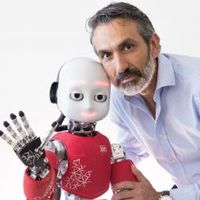Main Speakers
Giorgio Metta
Istituto Italiano di Tecnologia Scientifica DirectorBuilding components of human-robot interaction on the iCub humanoid robot.
Abstract: Human-robot collaboration is a challenging task that requires developing artificial perceptual skills to interpret human behaviors and exquisite timing to react seamlessly to such behaviors. One of the main goals of human-robot collaboration is to achieve a shared understanding of the task and the environment, as well as a mutual adaptation of behaviors and goals. In this talk, I will present two aspects of human-robot collaboration that can be generically understood as the “social” and the “physical” domain of interaction. All experiments are carried out on the iCub humanoid robot, a platform that offers rich perceptual and motor capabilities. In the social domain, I describe experiments that aim to understand how humans interactants interpret the behavior of the iCub in well-defined and controllable scenarios. On the other hand, in the physical domain, we develop direct sensing of human movements to integrate them in the iCub controllers.







